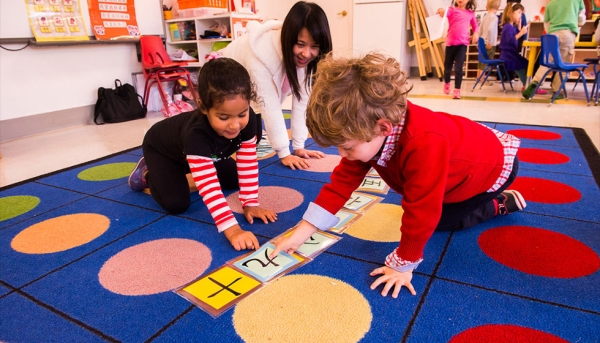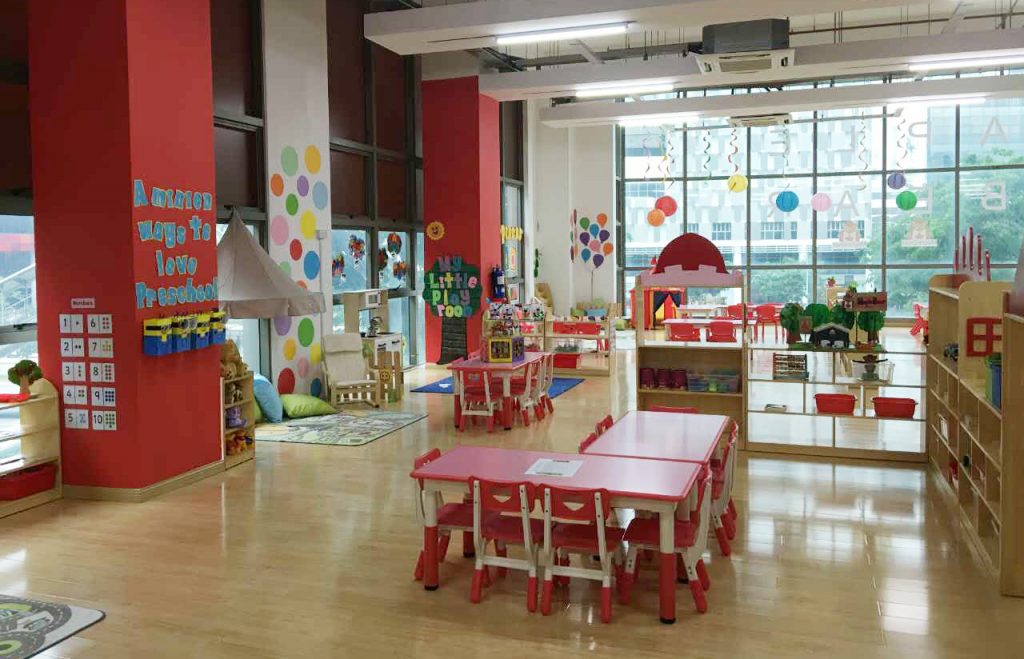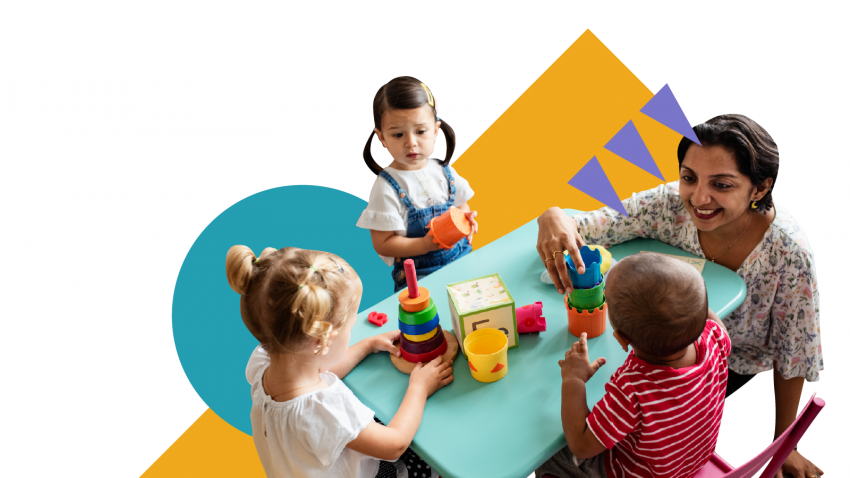
Breaking Boundaries: The Case for Adapting International Innovations in Preschools in Trivandrum
More and more children in Western countries are being enrolled in formal pre-kindergarten (pre-K/preschool) programs before starting kindergarten like such in preschools in Trivandrum and kindergartens near me. These programs have gained popularity among parents and play a crucial role in preparing children for school. Moreover, they have proven to be effective in minimizing academic achievement disparities in kindergarten and later stages of education.

According to a 2016 report from the American Enterprise Institute, the effectiveness of different pre-K approaches varies and there is no clear consensus. However, economists who have reviewed the evidence generally agree that investing in high-quality early childhood programs at kids playschool and playschools Trivandrum is beneficial, as the benefits outweigh the costs. Despite this widespread support from both the public and academia, a significant number of children in the U.S., specifically more than one in three, start preschools and in best preschool in Trivandrum without having attended any formal preschool program. This ratio is considerably higher than that seen in other affluent countries around the globe.
The Robert Wood Johnson Foundation commissioned us to explore ways to increase preschool enrollment rates by examining government policies and programs in high-income countries with higher rates of preschool participation than the U.S. We acknowledged that the identified policies may not be the sole cause of the differences in participation, as our study was purely focused on understanding policy variations.
As we conducted our study, we came across countries such as Denmark where 98 per cent of children aged 3 to 5 attend preschool, and countries like Poland which observed a remarkable increase of over 35 per cent (to 70 per cent) in preschool like that of international schools in Kerala such as the best play school here. We are interested in understanding the factors and policies in these countries that may have attributed to their high rate of participation or significant growth.
Five policy features that seem to be important have been identified through our research. This research involved examining official documents from 17 countries (refer to sidebar) and conducting interviews with a select group of European policymakers and experts.
- One of the key similarities seen in countries with high preschool attendance rates in the best preschool Trivandrum from the time of preschool admission is the legal right for all children to have access to preschool. This legal entitlement helps safeguard preschool programs from the impact of economic fluctuations or changes in political administration. Moreover, this entitlement establishes preschool as the default childcare choice for working parents such as the kids school in Trivandrum and international playschool Kerala, even if it is not mandatory for 4- and 5-year-olds to attend. Ultimately, the existence of a legal entitlement fosters the implicit expectation that parents will enrol their children in preschool.
- To promote widespread preschool enrollment across all income groups, it is imperative to establish robust financial backing from the government specifically for parents or through public funding. Countries that have achieved near-universal preschool enrollment at international playschool Kerala and the best kindergarten in Trivandrum have devised funding frameworks that guarantee affordable access to preschool for all children, regardless of their family’s middle-income status, even if they are ineligible for government initiatives.
- Countries that have the highest rates of preschool participation typically have comprehensive systems that involve parents from the start and offer a range of interconnected services for children aged 0-3 and their families at preschool near me and kindergartens Trivandrum. By establishing these early connections, children are more likely to enroll in preschool and the gaps in their readiness for preschool are reduced.
- In countries where preschool participation is high, certain communities and population groups continue to lack access to preschool facilities. To address this issue and promote preschool enrollment, additional measures are required to actively involve parents and community stakeholders. These efforts involve actively reaching out and providing training to individuals from underserved communities, enabling them to become staff members at montessori training and montessori teacher training. This recruitment strategy has been particularly successful in engaging immigrant and refugee communities.
- In contrast to Western countries, where government-funded programs like Head Start are exclusively for low-income children, other high-income countries link low-income families to the same preschool programs that are accessible to higher-income children. While some preferential treatment may be provided to the most vulnerable children and subsidies may differ, the objective remains to enable all children to participate in a single universal early care and education system that involves educators trained from preschool teacher training and teacher training in Trivandrum. This approach encourages social and economic integration, ensures consistent quality, and fosters positive interactions among children from diverse backgrounds.

Implementing these policies and program features in Western countries may be challenging, but several states and cities have successfully adopted universal pre-kindergarten programs with high participation rates across income groups. These successful programs often incorporate one or more of the five policy features mentioned earlier. For instance, New York City’s Pre-K for All program expanded from 20,000 to 70,000 slots between 2014 and 2016 while maintaining stringent quality standards and enrolling children from various income groups and neighbourhoods by educators from ttc in Kerala and ttc in Trivandrum. Georgia and Oklahoma also have noteworthy statewide universal pre-K programs. In 2016, Oklahoma achieved a 91% enrollment rate among four-year-olds, similar to many countries in Northern Europe. Although not on the same scale as Europe, these state examples demonstrate that significant progress can be made towards large-scale, high-quality pre-kindergarten programs for young children and their families in Western countries and at icse schools in Trivandrum as well as preschools in Trivandrum.
The main challenges observed in the European countries we explored include a lack of consistent and dependable funding, as well as the necessity to effectively coordinate policies among diverse providers and systems. However, state and local pre-K initiatives that have shown the most potential have effectively tackled these obstacles.
The Role of International Early Years Programs in Driving Educational Progress in Underdeveloped Nations
The importance of early years learning in the constantly changing world of global education cannot be overlooked. Developing countries have a crucial responsibility to establish strong educational systems that provide a solid base for children’s growth and progress such as in kindergartens near me and kids playschool. One key approach to unlocking the potential of early education and improving standards in these countries is through the strategic expansion of international schools and programs focused on early childhood education.

This article examines the benefits of introducing early years international schools in developing countries, showcasing their success in pioneering innovative teaching methods followed at playschools Trivandrum and best preschool in Trivandrum. By increasing the presence of these schools or dedicated early years centres in developing nations, we foster an environment of continual improvement and progress. We will explore the advantages for educational leaders, investors, and school organizations, and urge readers to reach out to Global Services in Education for assistance as brand partners in driving these initiatives.
If these educational institutions are internationalized and offer high-quality learning programs based on inquiry, they will make a substantial impact, regardless of whether they are referred to as kindergartens, preschools, nurseries, or daycare centres.
Nurturing Potential: Fostering Innovation and Best Practices in International Early Years Programs
The presence of global educational initiatives specifically aimed at early childhood education has a significant influence on the growth of innovative ideas and the promotion of effective teaching methods. Increasing the number of such institutions in developing nations provides a fertile environment for the development of new concepts and transformative approaches in early childhood learning at preschools and best play school. Educational leaders in these regions can greatly benefit from working alongside experienced educators from different backgrounds, accessing a wealth of knowledge on the latest teaching techniques and curriculum advancements in early childhood education.
Collaborations like these can also bring significant advantages to investors and school groups. By either investing in or forming partnerships with international programs focused on early childhood education at best preschool Trivandrum from the time of preschool admission, they can gain valuable exposure to advanced techniques and methods that can raise the standards of early years education in their area. This injection of innovation creates an environment that supports the development of young learners to their fullest potential and cultivates a lifelong passion for learning.
Empowering Minds: Global Perspective and Cultural Exchange
The distinguishing feature of international early years programs is their capacity to draw families from diverse cultural backgrounds. In educational institutions such as kids school in Trivandrum and international schools in Kerala, children learn alongside each other, creating bonds and fostering mutual understanding between different cultures. By increasing the presence of early years centres that adhere to international standards in developing nations, we provide local children with a global outlook right from the beginning, expanding their knowledge and fostering compassion and the ability to interact with other cultures effectively.
Educational leaders must acknowledge the tremendous worth of this cultural interchange and take advantage of the chance to empower young minds with a more expansive understanding of the world. By exposing children at the best kindergarten in Trivandrum and preschool near me to a range of viewpoints and customs, they are equipped with the necessary abilities to become engaged global citizens, ready to embrace the complexities and possibilities of an interconnected planet.

Enabling Growth: Enhanced Educator Quality and Professional Development
Early childhood centres often draw in well-qualified educators from around the globe, which results in a diverse teaching workforce and enhances the overall standard of early years education. These knowledgeable specialists from montessori training and montessori teacher training contribute their expertise and experience, thereby improving the quality of education provided. Through promoting a supportive and collaborative learning atmosphere, these educators can aid in the professional growth of local teachers, by exchanging effective teaching methods and innovative strategies.
The significance of improved educator quality during the early years should not be disregarded. Developing nations will reap advantages from the incorporation of expertise and exposure to worldwide trends in early childhood education at kindergartens Trivandrum tutored by staff trained from preschool teacher training. As a result, there will be a reform of the curriculum that conforms to global standards, granting young learners an enhanced educational experience that fosters their growth and development.
Seizing Opportunities: Economic Growth and Increased Investment in International Early Years Programs
The potential for significant economic growth lies in the expansion of early years programs in developing countries. Apart from their direct financial contributions to the education sector, these schools also have a wider impact on the local economy. By attracting families from diverse backgrounds, including expatriates in search of quality early years education for their children, these schools can stimulate economic growth, generate employment opportunities, and foster innovation across different sectors.
Investors and school groups cannot ignore the evident economic potential of putting money into early years centres through staff who are trained from teacher training in Trivandrum and ttc in Kerala. This investment not only allows for making a beneficial social impact but also provides an opportunity for lucrative ventures that align with the wider goal of advancing global education.
Building Bridges: Creating Sustainable Partnerships
To accomplish the goal of expanding early years programs and promoting educational progress in developing nations, it is essential to have dedicated and forward-thinking collaborators. Global Services in Education is prepared to assume this crucial role as brand partners, offering the essential guidance and assistance needed to establish enduring partnerships.
Play and Inquiry-based Early Years Programs Will Transform a Generation
Implementing early years programs that are centred around play and inquiry can have a revolutionary effect on cultivating a generation of dynamic, creative, and innovative critical thinkers. These educational approaches prioritize children’s inherent curiosity, creativity, and exploration. By introducing these programs in developing countries, we can positively shape the future by nurturing a new wave of forward-thinking individuals.

- Encouraging Curiosity and Imagination: By incorporating play into their programs, children are given the chance to engage with their environment, pose inquiries, and unleash their creativity. Through different play-based activities, children can explore and investigate the world around them, cultivating a deep fascination and an eagerness to gain knowledge. This early exposure to curiosity and imagination aids in building a strong basis for continuous learning throughout their lives.
- Critical thinking skills are stimulated through play and inquiry-based programs, as children are encouraged to ask questions, analyze information, and establish connections between ideas and their own experiences. By participating in activities that have no predetermined outcome, children develop the ability to think critically, make well-informed decisions, and assess the results, thereby enabling them to confront intricate problems with a thoughtful and analytical mindset.
- Play-based programs create an ideal environment for nurturing creativity and innovation. By encouraging children to explore and experiment freely, they gain the self-assurance to express their thoughts and come up with one-of-a-kind solutions to overcome obstacles. This ability to think creatively and innovatively plays a crucial role in tackling real-world problems in developing nations, where resourcefulness and adaptability are frequently essential.
- Collaborative Learning: Both play and inquiry-based methods highlight the importance of collaborative learning. Children engage in group activities, exchange ideas, and work together to achieve shared objectives. This promotes effective communication and interpersonal abilities, equipping them for future teamwork and networking opportunities. These skills are particularly valuable in developing countries, where community-driven initiatives can catalyze progress and growth.
- Developing a lifelong love for learning is emphasized through play and inquiry-based programs, which focus on making education enjoyable and meaningful for children. By fostering a positive attitude towards learning, individuals are more inclined to become lifelong learners, an essential characteristic for those in developing nations to remain adaptable to evolving surroundings and actively pursue continuous learning opportunities.
- Adopting cultural sensitivity: Programs that promote play and inquiry can be modified to honour and acknowledge the cultural background in every developing nation. By incorporating native traditions, languages, and customs into the educational plan, these programs can bolster cultural identity and foster a sense of pride in the children’s heritage. Highlighting cultural significance also strengthens the feeling of responsibility and involvement in education.
- Inclusive and diverse learning needs can be met through play and inquiry-based programs in education through teachers trained from ttc in Trivandrum training kids at icse schools in Trivandrum, promoting equity. By incorporating different learning styles, abilities, and backgrounds, these approaches enable a wider range of children to access high-quality education. Particularly in developing countries, where educational disparities tend to exist, early years programs that prioritize equity can establish the groundwork for a fair and all-encompassing society.

